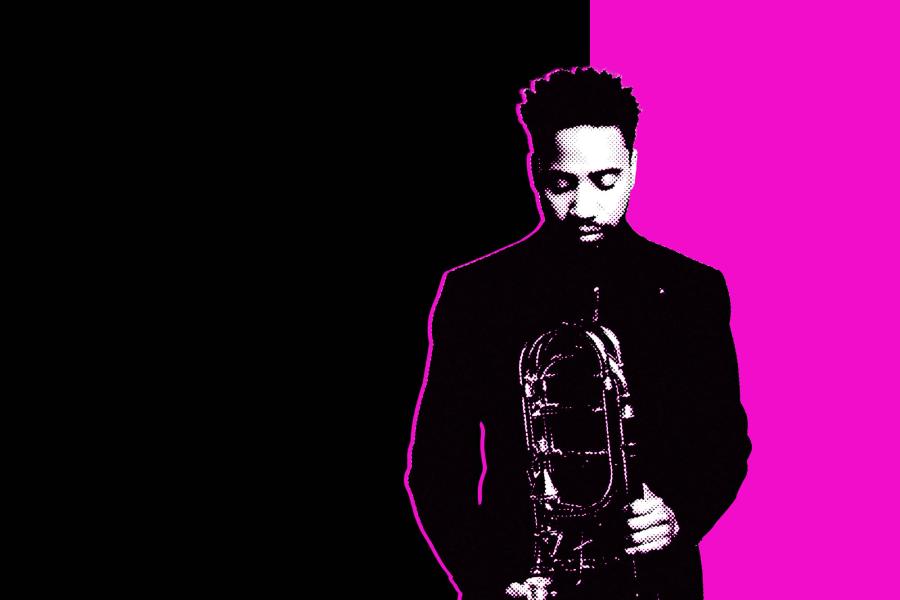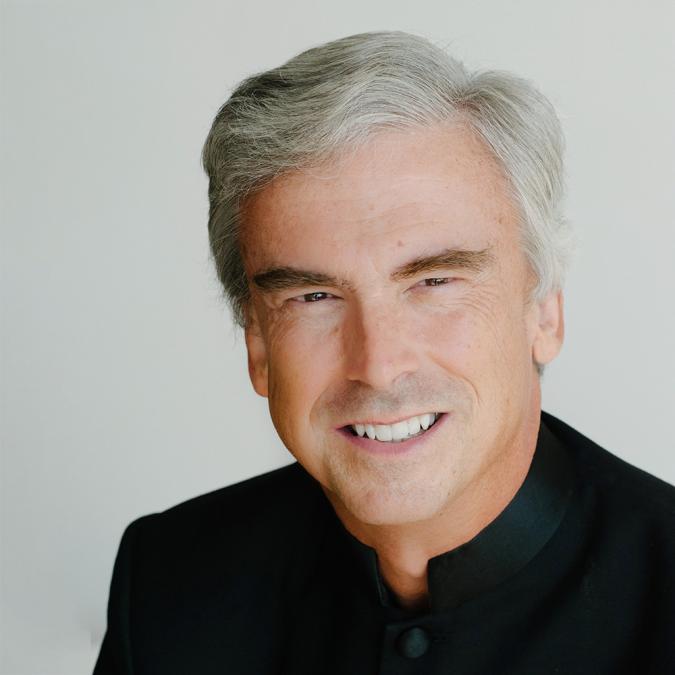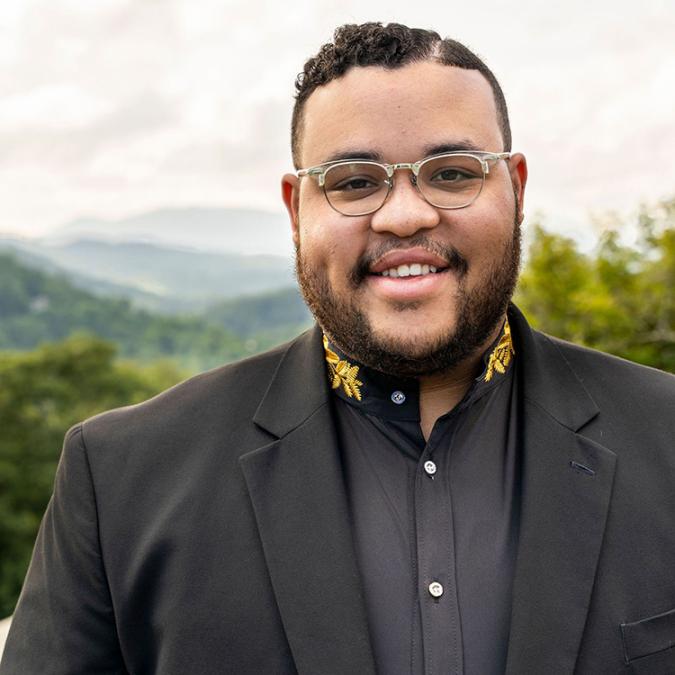
Jerry F. Junkin, conductor
T.j. Anderson, guest conductor
This concert will last about 90 minutes with one intermission.
Program
Adam Schoenberg
Cool Cat
Gustav Holst
First Suite in E-Flat Major
for Military Band, Op. 28, No. 1
Chaconne
Intermezzo
March
Jessica Meyer
Go Big or Go Home
T.j. Anderson, conductor
intermission
David Maslanka
A Child’s Garden of Dreams
I. There is a desert on the moon where the dreamer sinks so deeply into the ground that she reaches hell.
II. A drunken woman falls into the water and comes out renewed and sober.
III. A horde of small animals frightens the dreamer. The animals increase to a tremendous size, and one of them devours the little girl.
IV. A drop of water is seen as it appears when looked at through a microscope. The girl sees that the drop is full of tree branches. This portrays the origin of the world.
V. An ascent into heaven where pagan dances are being celebrated; and a descent into hell where angels are doing good deeds.
About the Program
Program notes by Mark Bilyeu
Adam Schoenberg
Cool Cat
Born November 15, 1980
Composed 2023
Premiered December 20, 2023. "The President's Own" United States Marine Band
Duration 5 minutes
“Cool Cat is inspired by the extraordinary life of P-22, the mountain lion that captured the heart of Los Angeles and beyond,” writes composer Adam Schoenberg. According to the National Park Service, “P-22 persisted for more than 10 years in the smallest home range that has ever been recorded for an adult male mountain lion. What made P-22 especially unique is that he somehow made his way into Griffith Park, the eastern flank of the Santa Monica Mountains, from the western side. That meant he likely crossed two major Los Angeles freeways, the 405 and 101, a feat other lions have died trying to do.” Schoenberg is an Emmy Award-winning and Grammy®-nominated composer who has twice been named among the top 10 most performed living composers by orchestras in the United States. His works for wind band have garnered special attention from some of the world’s leading ensembles, like “The President’s Own,” which commissioned and premiered Cool Cat, described by Schoenberg as a “playful and celebratory concert-opener...meant to get the party started.”
Gustav Holst
First Suite in E-flat Major
for Military Band, Op. 28 No 1
Born September 21, 1874 Cheltenham, UK
Died May 25, 1934, London, UK
Composed 1909
Premiered June 23, 1920, Royal Military School of Music, England
Duration 11 minutes
In 1909, Gustav Holst penned his Suite in E-Flat Major for Military Band, but it wasn’t until 1920 when the work was first premiered by a cadre of 165 musicians of the Royal Military School of Music in England. Though it is unclear why Holst set out to write such a work, its legacy as a seminal piece in wind band literature is crystalline. This suite in E-flat (and his second, ensuing suite, for the same instrumentation) was not commissioned, and for good reason: military bands of the day simply did not have their own repertoire written for them. Due mainly to the inconsistent and fluctuating instrumentation from ensemble to ensemble, British military bands of the day played primarily transcriptions of popular orchestral works. Holst found a way around this variable by scoring the work so that it could be played by a minimum of 19 musicians, with 16 additional parts he marked ad. lib. This ensured the suite would be accessible to as many bands as possible, without compromising the integrity of the work. Consisting of three movements, Holst utilizes the same three-note ascending motif as the basis for each movement’s theme. The Chaconne is built as a set of fifteen variations over a ground base first presented by the low brass that would make Henry Purcell proud. The second movement, an Intermezzo, is quirky, rhythmic, and chock-full of kinetic energy. Listen to how Holst presents two themes, and then layers them on top of each other at the movement’s climax. He closes out what we now know as his “first” suite for military band with a march (what else would it be!). The woodwinds trill dramatically, while the brass exclaim the three-note motive — this time in a descending form — before the full ensemble launches into the boisterous toe-tapper. The work concludes with one of the most iconic trombone moments in the literature; Host was, after all, a trombonist.
Jessica Meyer
Go Big or Go Home
Born 1974
Premiered Feb 14, 2019
Duration 3 minutes
With playing that is “fierce and lyrical” and works that are “other-worldly” (The Strad) and “evocative” (New York Times), Jessica Meyer is an award-winning composer and violist whose passionate musicianship radiates accessibility and emotional clarity. Her composition career began in 2014, at the age of 40, and has since had her works performed across the country. Her work Go BIG or go HOME is an adaptation of the last movement of her 2019 string quartet entitled “Get into the NOW” for the Miami-based group Nu Deco Ensemble. In it, she sought to “capture the spirit of what Miami inherently is. In Go BIG or Go HOME, you will find hints of funk, bluegrass, and Latin while being driven by groove, virtuosity, and moments of improvisation allowing members of the group to put their own personal signature on the piece. Most importantly, it is written from a place of self-realization, empowerment, and celebration of how joyous life can be.”
David Maslanka
A Child’s Garden of Dreams
Born August 30, 1943, New Bedford, MA
Died August 7, 2017, Missoula, MT
Composed 1981
Premiered 1982, Northwestern University Symphonic Wind Ensemble
Duration 35 minutes
David Maslanka crafted his work A Child’s Garden of Dreams in response to a portion of Carl Jung’s Man and His Symbols. “A very important case came to me from a man who was himself a psychiatrist. One day he brought me a handwritten booklet he had received as a Christmas present from his ten-year-old daughter. It contained a whole series of dreams she had had when she was eight. They made up the weirdest series of dreams I had ever seen, and I could well understand why her father was more than just puzzled by them. Though childlike, they were uncanny, and contained images whose origin was wholly incomprehensible to the father….In the unabridged German original, each dream begins with the words of the old fairy tale: “Once upon a time….” By these words the little dreamer suggests that she felt each dream were a sort of fairy tale, which she wants to tell her father as a Christmas present. The father tried to explain the dreams in terms of their context. But he could not do so because there appeared to be no personal associations with them…. These dreams open up a new and rather terrifying aspect of life and death. One would expect to find such images in an aging person who looks back upon life, rather than to be given them by a child…. Their atmosphere recalls the old Roman saying, “Life is a short dream,” rather than the joy and exuberance of its springtime…. Experience shows that the unknown approach of death casts an adumbratio (an anticipatory shadow) over the life and dreams of the victim. Even the altar in Christian churches represents, on the one hand, a tomb, and on the other, a place of resurrection – the transformation of death into eternal life.” Maslanka selected five of the twelve dreams as motifs for the movements of his composition.
About the Artists

Jerry Junkin
Serving since 1988 on the faculty of The University of Texas at Austin, where he holds the Vincent R. and Jane D. DiNino Chair for the Director of Bands, in addition to serving as a University Distinguished Teaching Professor, Jerry Junkin is recognized as one of the world’s most highly regarded wind conductors. Previously, he served on the faculties of both the University of Michigan and the University of South Florida. In addition to his responsibilities as Professor of Music and Conductor of the Texas Wind Ensemble, he serves as Head of the Conducting Division and teaches courses in conducting and wind band literature. He has served as Music Director and Conductor of the Hong Kong Wind Philharmonia since 2003, and as Artistic Director and Conductor of the Dallas Winds since 1993. He also serves as Visiting Professor at the Senzoku Gakuen College of Music Wind Ensemble in Tokyo, Japan. Mr. Junkin has conducted All-State bands and festivals in forty-eight states and five continents, and is a Yamaha Master Educator.

TJ Anderson
T.j. Anderson (he/him) is currently pursuing a Doctor of Musical Arts Degree in Wind Conducting as a Graduate Teaching Assistant at the University of Texas at Austin. He earned his Bachelor’s Degree in Music at Coastal Carolina University, focusing on percussion under the mentorship of Dr. Jesse Willis. T.j. continued his education by pursuing a Master’s Degree in Instrumental Conducting at Appalachian State University. There, he studied primarily with Dr. John Stanley Ross. As a graduate teaching assistant, T.j. made contributions to university bands, teaching conducting, band literature, and band methods courses. He also worked with the Marching Mountaineers as a winds and percussion instructor/arranger and served as Musical Director for the Appalachian Concert Band. In addition to his academic pursuits, T.j. has held leadership roles as Artistic Director and Conductor of the Festive Brass and Assistant Conductor of the Carolina Master Chorale. He is an active member of various professional music and education organizations and has been recognized as an Honorary Brother of Kappa Kappa Psi, Phi Mu Alpha Sinfonia, and a Sigma Alpha Iota Friend of the Arts.
Wind Ensemble
Flute/Piccolo
Gianna Baker
Riley Bender
Michelle Cheng
Maggie Chevtal
Ji Soo Yoon
Oboe/English Horn
Lademi Davies
Rachel Marquez
Nadia Para
Nico Shank
Clarinet
Daniel Aisenberg
Jacob Bricker
Destiny Lerma
Sadie Murray
Katelyn Nguyen
Nathan Richey
Matt Rockwell
Mason Smith
Alexander Vaquerizo
Bassoon
George Alazar
Wes Booker
Ally Rogers
Rishabh Sajjan
Saxophone
David Bennette
Lucy Croasdale
Jacob Feldman
Matthew Meyers
Marina Sakellakis
Horn
Madeline Artman
Chia-Ling Chiang
Owen Clark
Cheryll Huddleston
Jenny Wu
Trumpet
Samuel Acosta
Harmon Byerly
Michael Hawes
William Paladino
Anthony Ramirez
Angelica Salazar
Guillem Torró Senent
Trombone
Arsene Bien-Aime
Ross Ganske
Carlos Garcia
Eric Garcia (bass)
Josh Stout
Euphonium
Shelby Burton
Miguel Gonzales
Tuba
Mason Clark
Ethyn Evans
Percussion
Justin Cooperman
Ty Keller
Meghan Lawson
Caroline Richards
Michael Rivera-Gonzalez
Sean Simpson
Clinton Washington III
Harp
Natalie Rochen
Piano
Renan Branco
Double Bass
Andrés Hernández
Electric Bass
Mike Lebrias
Synthesizer
Lademi Davies
Upcoming Events
Wind Ensemble
Sunday, October 13, 4:00 p.m.
Bates Recital Hall
Les Noches & Ballet Mécanique
Featuring EEMS, Concert Chorale & Perucussion Ensemble
Thursday, October 17, 7:30 p.m.
Bates Recital Hall
Wind Ensemble
Featuring Patrick Hughes, horn
Sunday, November 10, 4:00 p.m.
Bates Recital Hall
Wind Ensemble
Saturday, January 25, 2025
The Long Center for the Performing Arts
Event Details
$5–15
All University of Texas at Austin students are allowed one free ticket as long as they are available. Student tickets must be picked up at the Box Office with valid student I.D. Seating is unassigned.
If you are a patron with ADA needs, please email tickets@mail.music.utexas.edu and we will reserve ADA seating for you.

